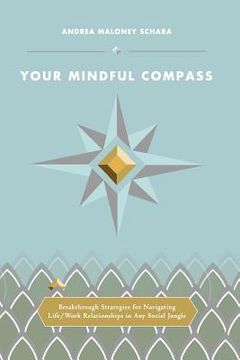Your Mindful Compass: Breakthrough Strategies For Navigating Life/Work Relationships In Any Social Jungle (en Inglés)
Reseña del libro "Your Mindful Compass: Breakthrough Strategies For Navigating Life/Work Relationships In Any Social Jungle (en Inglés)"
"Your Mindful Compass" takes us behind the emotional curtain to see the mechanisms regulating individuals in social systems. There is great comfort and wisdom in knowing we can increase our awareness to manage the swift and ancient mechanisms of social control. We can gain greater flexibility by seeing how social controls work in systems from ants to humans. To be less controlled by others, we learn how emotional systems influence our relationship-oriented brain. People want to know what goes on in families that give rise to amazing leaders and/or terrorists. For the first time in history we can understand the systems in which we live. The social sciences have been accumulating knowledge since the early fifties as to how we are regulated by others. S. Milgram, S. Ashe, P. Zimbardo and J. Calhoun, detail the vulnerability to being duped and deceived and the difficulty of cooperating when values differ. Murray Bowen, M.D., the first researcher to observe several live-in families, for up to three years, at the National Institute of Mental Health. Describing how family members overly influence one another and distribute stress unevenly, Bowen described both how symptoms and family leaders emerge in highly stressed families. Our brain is not organized to automatically perceive that each family has an emotional system, fine-tuned by evolution and "valuing" its survival as a whole, as much as the survival of any individual. It is easier to see this emotional system function in ants or mice but not in humans. The emotional system is organized to snooker us humans: encouraging us to take sides, run away from others, to pressure others, to get sick, to blame others, and to have great difficulty in seeing our part in problems. It is hard to see that we become anxious, stressed out and even that we are difficult to deal with. But "thinking systems" can open the doors of perception, allowing us to experience the world in a different way. This book offers both coaching ideas and stories from leaders as to strategies to break out from social control by de-triangling, using paradoxes, reversals and other types of interruptions of highly linked emotional processes. Time is needed to think clearly about the automatic nature of the two against one triangle. Time and experience is required as we learn strategies to put two people together and get self outside the control of the system. In addition, it takes time to clarify and define one's principles, to know what "I" will or will not do and to be able to take a stand with others with whom we are very involved. The good news is that systems' thinking is possible for anyone. It is always possible for an individual to understand feelings and to integrate them with their more rational brains. In so doing, an individual increases his or her ability to communicate despite misunderstandings or even rejection from important others. The effort involved in creating your Mindful Compass enables us to perceive the relationship system without experiencing it's threats. The four points on the Mindful Compass are: 1) Action for Self, 2) Resistance to Forward Progress, 3) Knowledge of Social Systems and the 4) The Ability to Stand Alone. Each gives us a view of the process one enters when making an effort to define a self and build an emotional backbone. It is not easy to find our way through the social jungle. The ability to know emotional systems well enough to take a position for self and to become more differentiated is part of the natural way humans cope with pressure. Now people can use available knowledge to build an emotional backbone, by thoughtfully altering their part in the relationship system. No one knows how far one can go by making an effort to be more of a self-defined individual in relationships to others. Through increasing emotional maturity, we can find greater individual freedom at the same time that we increase our ability to cooperate and to be close to others.

